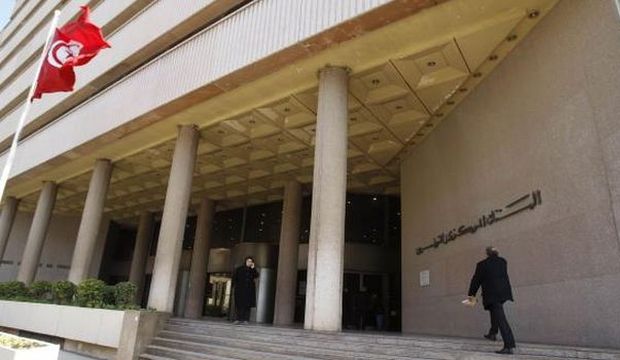
A man walks towards the Central Bank of Tunisia in the capital Tunis, on December 27, 2013. (Reuters/Zoubeir Souissi)
Tunis, Asharq Al-Awsat—The Tunisian central bank said on Tuesday it was lowering its growth forecast for 2014, amid growing budget and trade deficits and a general state of economic stagnation in the North African country, which has faced serious economic problems since the start of the Arab Spring in 2011.
Following a meeting of its board of directors on Tuesday, the Central Bank of Tunisia issued a statement saying the “latest estimates indicated lowering economic growth expectations for 2014 to 2.3–2.4 percent from the previous forecast of 2.8 percent,” adding it expected 3 percent growth the following year
The bank warned of the “seriousness of the dangers threatening [the country’s] finances, especially in light of . . . the increasing deterioration in the trade deficit, particularly with the decrease in exports, which could become more serious in the coming months due to the likely [economic] paralysis in the Eurozone, all of which makes clear the need to quickly put in place a series of effective measures aiming to control [the inflow of] imports.”
The country’s trade deficit reached 22.7 percent, or 9.4 billion Tunisian dinars (5.5 billion US dollars), in August as a result of a drop in exports by 0.6 percent and an increase in imports of 6.2 percent, the bank said.
This in turn caused a further widening of the budget deficit, which now stood at 6.6 percent of GDP during the first eight months of the year, up from 5.3 percent during the same period the previous year.
The bank said in July it expected the deficit to grow to 8 percent by the end of the year.
There was “some improvement” in the country’s inflation rate, however, which the bank said had dropped to 5.8 percent in August from 6 percent the previous month.
The bank raised its key interest rate to 4.75 percent from 4.5 percent in June in order to counter inflation, in what was its second rate hike in six months. On Tuesday, the bank said it had opted to keep interest rates at their current 4.93 percent, which were down from 4.94 percent the previous month due to adequate liquidity levels at Tunisian banks.
The Tunisian economy has been experiencing rising, double-digit unemployment and high inflation since the uprising which toppled longtime dictator Zine El-Abidine Ben Ali in 2011. The aftermath of the revolution left some of the country’s major industries and sectors reeling—especially the lucrative tourism sector, which has struggled to attract visitors back to the country since the uprising.
In July, the government trimmed the state budget for the current financial year by 350 million dinars (319 million dollars) and cut state subsidies on fuel in order to rein in public spending and create more job opportunities.

Trackbacks/Pingbacks